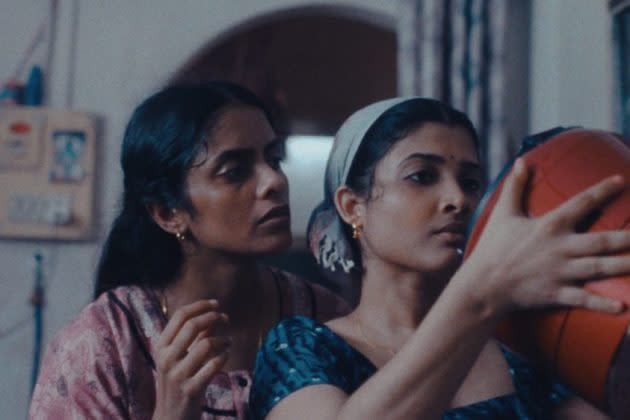‘All We Imagine as Light’ Review: A Glowing Portrait of Urban Connection and Unexpected Sisterhood

There is a moment early on in Payal Kapadia’s “All We Imagine as Light” — her second feature after 2021’s lyrical hybrid doc “A Night of Knowing Nothing” — that exemplifies this gently coruscating movie’s peculiar beauty. Prabha (Kani Kusruti) a hardworking nurse with tired eyes rides the commuter train home at the end of another long day, gazing out at the glimmering blur of the city. Her life is anything but a fairground and yet, clinging to a pole to steady herself with the rushing night air stirring her hair, she could almost be riding a carousel. Just two features into her young career, Kapadia has established her rare talent for finding passages of exquisite poetry within the banal blank verse of everyday Indian life.
Prabha works in a slightly shabby local hospital, where she spends her days tending to even the most difficult cases with a conspiratorial compassion she rarely seems to extend to herself. There is a stiffness within her that softens when she is caring for others and trying to solve their problems, be it an elderly patient beset by hallucinations of her dead husband or her best friend Parvati (Chhaya Kadam), a widow who is being cruelly forced out of her home by ruthless property developers. Husbands have a tendency to be dead or absent here: Prabha’s own arranged marriage was still in its infancy when, some years ago, her man left for Germany to find work, trailing promises to send for her when he could. She hears from him less and less.
More from Variety
Prabha’s solitary daily commute brings her back to the apartment she shares with fellow nurse, Anu (Divya Prabha), a pretty young woman involved in a clandestine relationship with a Muslim boy, Shiaz (Hridu Haroon). At first, Anu display a younger generation’s natural scorn for Prabha as representative of the stuffy older cohort, sneaking in late and lying to her about where she has been. And at first, the feeling is mutual, with Prabha upbraiding Anu when a co-worker warns that her not-so-secret trysts with Shiaz are starting to give her a bad reputation.
Like the sisters in Jane Austen’s “Sense and Sensibility,” Anu is all dreams and rebellion and amorous aspiration, Prabha all practical capability. Anu texts Shiaz to imagine her kisses in the raindrops that fall on his skin while Prabha hustles to bring the drying hospital linens in to avoid the same downpour. But unbeknownst to both, they are united by a streak of selflessness when it comes to their profession. When a distraught young woman who at 24 already has three children discovers her contraceptive options are too much for her to afford, Anu slips her some pills for free.
Then two strange if hardly miraculous events occur that bring the women indefinably closer. First, Anu brings a pregnant cat home and it becomes their shared pet. And second, a package arrives from Prabha’s far-off husband, containing, of all things, a shiny, expensive-looking rice cooker that looks as alien to their tiny kitchen as the monolith in “2001.” Inexplicably disturbed by the gadget and what it means for the limbo of her marriage, Prabha stashes it under the sink.
Meanwhile, at work, Prabha finally relents and lets Doctor Manoj (Azeez Nedumangad) — an out-of-towner who is finding it hard to learn the language of Mumbai — take her on a nighttime walk. They end up sharing little more than some heartfelt confidences. As shot in DP Ranabir Das’s casually luxurious images, which are attuned to about a hundred different types of practical light from glowing cellphone screens to fairy lights to fireworks exploding over the Mumbai skyline, this scene has an oddly gorgeous glamor to it. Few films have ever so beautifully captured the lonesome romance of Mumbai after dark.
It’s a portrait of the city so unusually rich and lived in that it’s almost a wrench to leave it when, in the film’s second half, Prabha and Anu make the journey to the village by the sea where Parvati, finally fed up with the constant harassment of the Mumbai developers, is moving back into her childhood home. But the location change soon makes sense within the film’s larger theme of displacement. Both Anu and Prabha originally hail from Kerala and this brief moment of respite from the numbing bustle of massive Mumbai allows us to focus more directly on the bonds of mutual support that have sprung up between the women. We also discover how their fragile-seeming connection has proven to have unexpected tensile strength.
It is here, away from the noise and judgments of the city, that Anu and Shiaz’s affair comes out of the shadows when Prabha discovers that he has followed his young lover. And it’s here too that Prabha, who is in danger of disappearing entirely in Mumbai, swaddled in the invisibility cloak of respectability and encroaching middle-age, gets to acknowledge that maybe in Parvati and Shiaz and especially Anu, she has found her own little tribe, and can quit waiting around for a husband who may never return.
The film’s title is only ever obliquely explained, in a story someone tells of a factory worker so exploited by his workplace’s gruelingly long shifts that at times he could barely remember what the daylight looked like. But at the gentle resolve of “All We Imagine as Light” — which is nothing so strained as a neat wrap-up — while the tinkling piano theme plays out one last time and strings of LEDs twinkle, we can hope these women will not suffer the same fate. The light is all around them, and if they have to imagine it, it’s only because they cannot see it emanates from within.
Best of Variety
Sign up for Variety’s Newsletter. For the latest news, follow us on Facebook, Twitter, and Instagram.